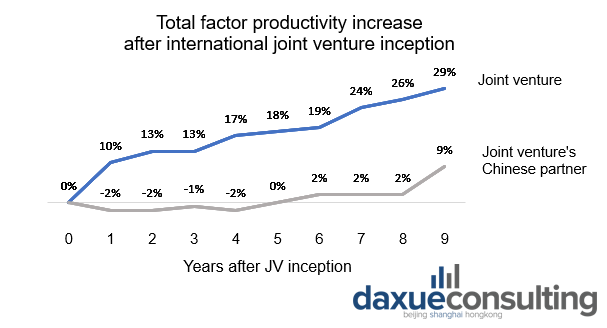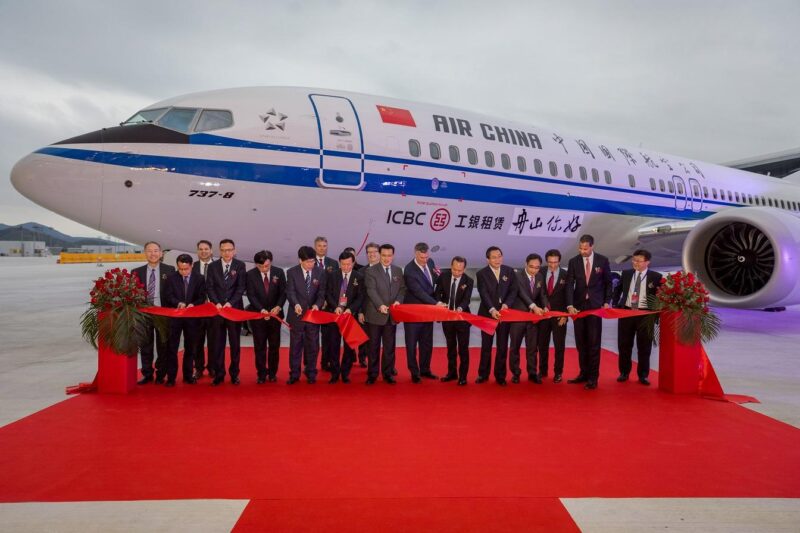China has been an appealing destination for global businesses due to its market size, manufacturing and supply chain strengths, developed e-commerce ecosystem and innovation capabilities. This has led multinationals to enter the Chinese market through exporting, licensing, franchising, strategic alliances, acquisitions, and joint ventures (JVs). JVs allow a foreign company to partner with a local company to establish a new entity, with the sharing of equity and decision-making. In the past, JV agreements were mandatory for a foreign company to enter the Chinese market, due to the country’s stringent protectionism. However, over recent years, the government has been progressively loosening in specific sectors, a development that has not diminished the appeal of joint ventures in China.
Download our guide to Chinese gifting habits

Joint ventures in China have decreased during the pandemic
The COVID-19 pandemic has heavily impacted businesses around the world, including in China. In 2020, most companies were focused on mitigating their losses and dealing with labor excess and supply chain disruptions. The conditions were not welcoming to joint venture agreements, with the number of JVs formed in China falling by more than 50% from 2019 to 2020. Additionally, some foreign nations blamed China for the pandemic. The prevailing sentiment regarding China-US trade has taken a negative turn, impacting individuals from both the Democratic and Republican camps in the United States, a consequence of the ongoing pandemic. In light of their respective concerns regarding the handling of the pandemic by China, both political parties now advocate for a more stringent US trade policy against China.
Now that the crisis has dissipated, the number of Sino-foreign JVs has increased again, increasing from 84,000 in Q1 2020 to 124,600 in Q1 2022. In fact, JV activity is usually the highest immediately after an economic downturn. Moreover, the pandemic has created an environment of uncertainty, especially in China where pandemic regulations were particularly stringent. When market uncertainty is high, JV is one of the most attractive entry methods as it requires less upfront investment than an acquisition, for example.
Why do companies engage in joint ventures in China?
Access to a growing market and more resources
Despite JVs not being mandatory in many industries anymore, they present many advantages that make them attractive to foreign companies looking to enter the Chinese market. A successful JV can give the foreign party greater access to resources they do not possess in-house, which includes specialized labor and technological skills. Moreover, a JV can have a positive effect on the total factor productivity of the foreign partner. It is estimated that after nine years of a JV agreement, joint ventures can become 29% more productive, while Chinese partners can become 9% more productive than before.

Apart from labor and technology, a JV agreement can also allow foreign entities to create relationships with suppliers and distributors. Establishing trusting relationships with supply chain partners in China can be particularly tricky for foreign companies, as business relationships in China rely on ‘Guanxi’ and ‘Mianzi’. Having a local JV partner can make navigating these local intricacies easier.
Many foreign companies, including those well-established, find the idea of resource sharing appealing. For example, in 2017, the American aircraft manufacturer Boeing invested USD$33 million in a JV with COMAC, a Chinese state-owned aeroplane manufacturer. Boeing aimed to establish a completion plant in Zhoushan, Zhejiang province, through the joint venture where COMAC’s specialized talents would oversee the cabin installation and painting of the aircraft. They inaugurated the first airplane completed in Zhoushan in December 2018, and Air China used it. This JV is an opportunity for Boeing to establish itself in the world’s largest market for commercial aeroplanes while leveraging its partner’s competencies.


Regulatory expertise and risk mitigation
Engaging in a JV with a Chinese company can also be a significant help for foreign businesses to deal with local regulations and complex bureaucratic procedures. A local partner often has a deep understanding of relevant regulations, and they might even have established relationships with government authorities, which can facilitate business operations. Moreover, collaborating with a Chinese company is a way to share the risks between partners and gain valuable guidance on risk management strategies.
Joint ventures in China for better cultural synergy and relationship-building
Joint ventures are a way to avoid cultural faux pas
In addition to providing strategic benefits, entering into a JV agreement with a Chinese company can also facilitate effective cross-cultural communication, playing a pivotal role in better understanding and communicating with local customers. Achieving cultural resonance can be an immense challenge for a company without the assistance of a local partner, as it necessitates seamless integration of the business into every facet of the local community. For instance, this could involve adapting marketing strategies to align with local customs, hiring employees who understand and resonate with the local culture, and even customizing products or services to better suit local preferences.
Moreover, appealing to local customs and cultural specificities can be a powerful way to connect with customers and deliver an authentic service. This is particularly true in China, where the ‘Guochao’ trend necessitates foreign companies to integrate more Chinese elements into their products. In that regard, partnering with a Chinese company can prevent any cultural faux pas, as many foreign brands have done in the past.
The Spanish clothing company, Desigual, recognized the important role a local partner plays in understanding Chinese customers. In 2022, they announced a JV agreement with the Chinese company E-Shine. This partnership is not only to increase the brand’s presence in the foreign market but also to better understand customers’ habits and preferences. Desigual’s CEO recognizes that this is the ‘key to success’ and that they should put their trust in a ‘strategically positioned local partner’.
Joint ventures can foster local acceptance
Engaging in a JV agreement with a Chinese firm can also foster greater local acceptance. First, JVs can generate employment opportunities within the local community, with jobs created within the new entity and indirectly within the supply chain. Creating jobs has a tangible positive impact on the community, which can contribute to the acceptance of the foreign company’s presence in China. Moreover, thanks to the partnership with a local partner, the foreign firm demonstrates its commitment to understanding and respecting the local culture, thus building trust and acceptance. Finally, while some customers might be unfamiliar with the foreign entity, they might have a pre-existing trust in the Chinese partner. This can serve as a bridge, leading to greater success than attempting to enter the market independently.
Issues foreign partners in China face
While JV agreements are an attractive way to enter the Chinese market, they represent challenges that need to be addressed. First, from an administrative point of view, there are regulatory complexities, intellectual property (IP) concerns and employment regulations. JVs often require the approval of government agencies, such as the Ministry of Foreign Economic Relations and Trade. The process is complex and includes a feasibility study report, the application, the contract, a list of candidates for the director positions and other documents that must be written in Chinese. Moreover, sharing technology and proprietary knowledge in a JV could potentially lead to issues of IP theft. Safeguarding valuable IP thus requires careful contractual arrangements. Finally, JVs must comply with Chinese labor regulations, which may differ from the foreign partner’s expectations.
Additionally, JVs must be careful about the competitive landscape and changing market dynamics. In certain industries, China promotes domestic companies and might still have protectionist measures in place. This can create challenges for foreign companies seeking to establish JVs in these sectors. At the same time, business conditions are rapidly evolving in China, which requires JVs to be flexible. Lastly, JV partners might face issues with unequal control and decision-making, cultural differences, uneven resource contributions, and conflicting goals and expectations.
How to prepare for joint ventures in China
Navigating these challenges requires thorough due diligence from the foreign company when selecting a JV partner, as their business vision, must be aligned. Before the contract is signed, there should be a clear discussion between both parties regarding all the key issues. They must also agree on a governance framework, design an equitable JV structure, and craft terms to safeguard each party’s IP rights. Finally, after the JV agreement is officially in effect, clear communication and frequent re-evaluation of each party’s interests are necessary.
What we can learn about joint ventures in China:
- China’s market size, manufacturing strength, e-commerce growth, and innovation capabilities make it appealing to foreign businesses. Although no longer mandatory in many sectors, JVs have been a popular entry method for foreign companies in China.
- During the first year of the COVID-19 pandemic, the number of JV agreements in China has decreased by more than 50%. Yet, post-pandemic recovery saw a resurgence in JV activity as they are an attractive entry method in uncertain business environments.
- Entering into a JV agreement with a Chinese company provides advantages such as having access to a growing market, specialized labor and technology, and supply chain relationships.
- Additionally, having a local partner can help navigate local regulations, mitigate risks, and facilitate cross-cultural assimilation and local acceptance from Chinese customers.
- Despite the many advantages a successful JV can bring, some challenges need to be addressed, such as administrative complexities, protectionist measures, and conflicts with the Chinese partner. To mitigate these risks, a foreign company must take the necessary precautions throughout the process which include thorough due diligence, communication, and negotiations.





